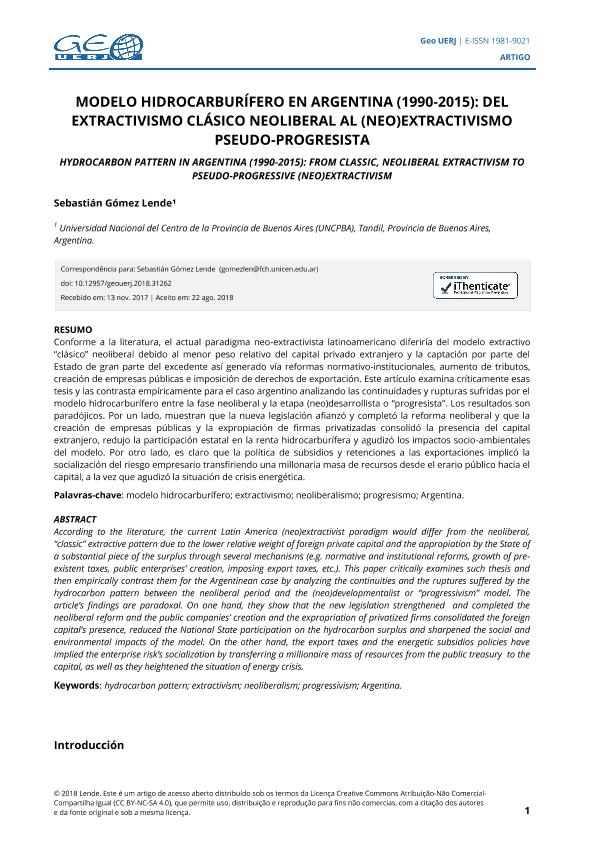Artículo
Conforme a la literatura, el actual paradigma neo-extractivista latinoamericano diferiría del modelo extractivo “clásico” neoliberal debido al menor peso relativo del capital privado extranjero y la captación por parte del Estado de gran parte del excedente así generado vía reformas normativo-institucionales, aumento de tributos, creación de empresas públicas e imposición de derechos de exportación. Este artículo examina críticamente esas tesis y las contrasta empíricamente para el caso argentino analizando las continuidades y rupturas sufridas por el modelo hidrocarburífero entre la fase neoliberal y la etapa (neo)desarrollista o “progresista”. Los resultados son paradójicos. Por un lado, muestran que la nueva legislación afianzó y completó la reforma neoliberal y que la creación de empresas públicas y la expropiación de firmas privatizadas consolidó la presencia del capital extranjero, redujo la participación estatal en la renta hidrocarburífera y agudizó los impactos socio-ambientales del modelo. Por otro lado, es claro que la política de subsidios y retenciones a las exportaciones implicó la socialización del riesgo empresario transfiriendo una millonaria masa de recursos desde el erario público hacia el capital, a la vez que agudizó la situación de crisis energética. According to the literature, the current Latin America (neo)extractivist paradigm would differ from the neoliberal, “classic” extractive pattern due to the lower relative weight of foreign private capital and the appropiation by the State of a substantial piece of the surplus through several mechanisms (e.g. normative and institutional reforms, growth of preexistent taxes, public enterprises’ creation, imposing export taxes, etc.). This paper critically examines such thesis and then empirically contrast them for the Argentinean case by analyzing the continuities and the ruptures suffered by the hydrocarbon pattern between the neoliberal period and the (neo)developmentalist or “progressivism” model. The article’s findings are paradoxal. On one hand, they show that the new legislation strengthened and completed the neoliberal reform and the public companies’ creation and the expropriation of privatized firms consolidated the foreign capital’s presence, reduced the National State participation on the hydrocarbon surplus and sharpened the social and environmental impacts of the model. On the other hand, the export taxes and the energetic subsidios policies have implied the enterprise risk’s socialization by transferring a millionaire mass of resources from the public treasury to the capital, as well as they heightened the situation of energy crisis.
Modelo hidrocarburífero en Argentina (1990-2015): del extractivismo clásico neoliberal al (neo)extractivismo pseudo-progresista
Título:
Hydrocarbon pattern in Argentina (1990-2015): from classic, neoliberal extractivism to pseudo-progressive (neo)extractivism
Fecha de publicación:
12/2018
Editorial:
Universidade do Estado do Rio de Janeiro. Instituto de Geografia
Revista:
Geo UERJ
ISSN:
1415-7543
e-ISSN:
1981-9021
Idioma:
Español
Tipo de recurso:
Artículo publicado
Clasificación temática:
Resumen
Palabras clave:
Modelo Hidrocarburífero
,
Extractivismo
,
Neoliberalismo
,
Progresismo
,
Argentina
Archivos asociados
Licencia
Identificadores
Colecciones
Articulos(IGEHCS)
Articulos de INSTITUTO DE GEOGRAFIA, HISTORIA Y CS. SOCIALES
Articulos de INSTITUTO DE GEOGRAFIA, HISTORIA Y CS. SOCIALES
Citación
Gómez Lende, Sebastián; Modelo hidrocarburífero en Argentina (1990-2015): del extractivismo clásico neoliberal al (neo)extractivismo pseudo-progresista; Universidade do Estado do Rio de Janeiro. Instituto de Geografia; Geo UERJ; 33; 12-2018; 1-29
Compartir
Altmétricas




